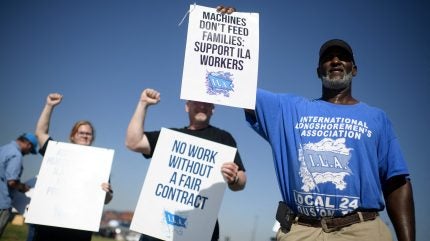
The economic impact of this week’s US port strike has yet to be quantified as warring parties reached a “tentative” agreement to end the standoff.
Strikes by port workers across the East and Gulf Coasts started on Tuesday 1 October as the union representative, the International Longshoremen’s Association (ILA), battled to secure increased wages before new contracts kicked in.

Discover B2B Marketing That Performs
Combine business intelligence and editorial excellence to reach engaged professionals across 36 leading media platforms.
While the so-called master contracts, which officially ended on 30 September, have been extended early into the new year until a wage settlement is set in stone, there is likely to be a backlog of stranded ships seeking to unload cargo, and a similar backlog of agri-food stuffs and other goods.
The ILA and its opposite number, the United States Maritime Alliance (USMX), issued a joint statement yesterday (3 October) outlining the way forward.
Both parties said they had “reached a tentative agreement on wages and have agreed to extend the master contract until January 15, 2025, to return to the bargaining table to negotiate all other outstanding issues”.
They added: “Effective immediately, all current job actions will cease and all work covered by the master contract will resume”.

US Tariffs are shifting - will you react or anticipate?
Don’t let policy changes catch you off guard. Stay proactive with real-time data and expert analysis.
By GlobalDataFiner details of the wage terms were not disclosed by the ILA and USMX, but various media reports suggested the deal is for a 61-62% increase over the course of the new six-year contract.
An offer of around 50% had reportedly been proffered by the USMX a day before the strike started on 1 October, short of the 77% increase sought by the ILA on behalf of its members.
Days before the strike began, the American Farm Bureau Federation warned of the economic consequences if industrial action was not averted, putting the potential costs for agri-food exports and imports in the billions of dollars region.
“Over a one-week period, the potential value of disrupted containerised ag exports is estimated at $318m,” the Federation noted. “Collectively, the value of containerised agricultural products passing through ILA-controlled ports, including both imports and exports, exceeds $1.4bn per week.”
The US Chamber of Commerce had issued a letter to President Biden, on behalf of a plethora of industry associations from meat to dairy, fresh produce and frozen foods, urging the president to step in before the strike began.
Just Food has asked the Chamber for its thoughts on the tentative agreement and what disruption the short-lived action may have caused.
Meanwhile, The White House issued a reactionary statement from Biden.
“Today’s tentative agreement on a record wage and an extension of the collective bargaining process represents critical progress towards a strong contract,” it read.
“I congratulate the dockworkers from the ILA, who deserve a strong contract after sacrificing so much to keep our ports open during the pandemic. And I applaud the port operators and carriers who are members of the US Maritime Alliance for working hard and putting a strong offer on the table.”





